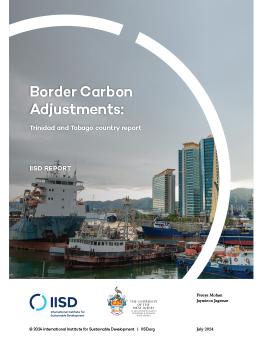
Border Carbon Adjustments: Trinidad and Tobago country report
This country report examines the effects of border carbon adjustment (BCA) schemes on Trinidad and Tobago, incorporating insights from diverse stakeholders. It addresses challenges such as short-term impacts on exports, economic activity, and employment. Recommendations highlight balancing climate action with equity through international collaboration and best practices, including special treatment for developing countries in BCA design.
-
Compared to other countries, Trinidad and Tobago has lower GHG reduction goals, regulations, capabilities and technology, and access to finance for reducing emissions. Border carbon adjustment measures such as the EU Carbon Border Adjustment Mechanism (CBAM) could increase production costs and make the country's exports in specific sectors less competitive.
-
Border carbon adjustments (BCAs) can be an opportunity for Trinidad and Tobago to transition away from fossil fuels toward cleaner energy sources. But this will require substantial investments supported by both domestic policy and international assistance.
-
BCAs will achieve the objective of effective climate action in a developing country like Trinidad and Tobago by adopting a phased approach to implementation, coordinated action by government and industry, and international assistance through finance and technology transfer, while respecting the principle of common but differentiated responsibilities.
This country report is based on background research by IISD and the University of the West Indies – St. Augustine campus (UWI-SAC) to assess the potential impact of BCA schemes, particularly the European Union Carbon Border Adjustment Mechanism (CBAM) on Trinidad and Tobago, supplemented by detailed discussion in two dialogues organized within the country. The two dialogues heard the views and perspectives of stakeholders from government, industry, think tanks and academics, civil society, finance providers, and labour. While acknowledging the need for BCAs to reach the Paris Agreement goals, these views and perspectives also outline the challenges for countries like Trinidad and Tobago. These include:
- adverse impact on exports and thus on economic activity and employment in the short term,
- substantial cost of compliance and limited availability of finance and investment to transform the current production methods in the affected sectors, and
- need for the consideration of the special situation of developing countries like Trinidad and Tobago.
The stakeholder discussion also led to recommendations for achieving balance between climate action and equity. One key conclusion is the need for international collaboration and use of best practices, including for the special treatment of developing countries in the design of BCAs.
You might also be interested in
Border Carbon Adjustments: Pivotal design choices for policy-makers
This policy brief covers the pivotal choices in the design of border carbon adjustments, aiming to provide useful insights to policy-makers and set the ground for the broader discussions about the best practices.
Border Carbon Adjustments: Priorities for international cooperation
This IISD policy brief looks into border carbon adjustment design elements that are priorities for international cooperation, as well as the possible venues, formats, and shapes that such a discussion might take.
Border Carbon Adjustment Mechanisms and Impacts on Vietnam
This report consolidates, analyzes, and presents views and perspectives of stakeholders from Vietnam on border carbon adjustment (BCA) schemes to contribute to the global debate on BCA good practices.
The United Kingdom's Strategy for Carbon Border Adjustment in a Changing Global Landscape
This report consolidates, analyzes, and presents views and perspectives of United Kingdom stakeholders on its proposed Carbon Border Adjustment Mechanism (CBAM) to contribute to the global debate on international principles and best practices for national border carbon adjustment schemes.